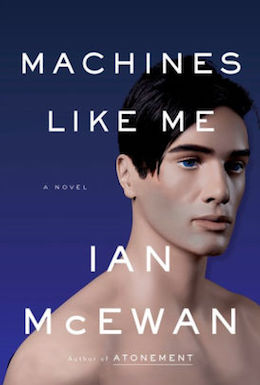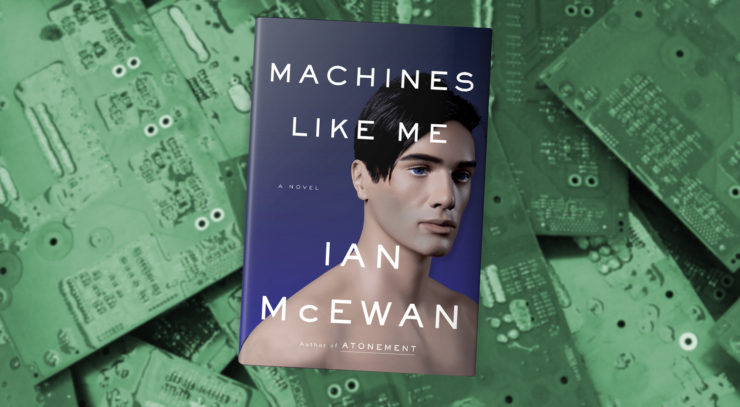Ian McEwan’s fiction frequently grapples with grand moral issues and explores the grey areas that can arise when imperfect people—or, you know, people—attempt to solve problems that may not have a perfect solution. Ian McEwan’s fiction has also been known to possess an unnerving or even uncanny streak: his novel Black Dogs stops just short of venturing into the horrific, for instance. So it’s less bizarre than it initially seems for him to be venturing into the realm of science fiction.
Machines Like Me is a curious work, though. At times it reads like two shorter novels woven together, linked up by the couple at its center. One of these narratives is overtly science fictional, while the other ventures into the same unsettling moral territory as some of McEwan’s best fiction. But it’s also set in an alternate timeline, an early 1980s Great Britain where the timeline shifted from our own several decades earlier.
The bulk of these changes involve Alan Turing. There are a few other quiet hints of alterations—George Orwell and Joseph Heller, among others, are known for different works in this world than they are in our own, and a stray line suggests that World War II’s Pacific theatre concluded very differently than it did in our own world—but Turing is the key. In this timeline, he is hailed as a national hero; rather than a tragic death in the 1950s, Turing is still going strong here, and his mind has led to a host of seismic scientific discoveries. In some ways, this has led to elements of modern technology—specifically, the internet—arising decades earlier. The chief breakthrough, though, has been the development of artificial humans, twenty-five total, all of them named Adam or Eve.
Machines Like Me is narrated by a thirty-something man named Charlie who impulsively purchases an Adam. Charlie is in a relationship with a woman named Miranda, who’s a decade his junior; Charlie and Miranda answer a series of questions to establish Adam’s personality. Early on, Adam warns Charlie that Miranda may not be entirely trustworthy, pointing to elements of her testimony that convicted a man named Gorringe of rape years earlier. Gorringe’s release from prison, and the question of the threat he may again pose, serves as one the two ethical hubs on which this novel spins.
The other is Adam himself, and how his presence—almost human, but also fundamentally unknowable in some ways—affects the bond between Charlie and Miranda. Adam is a wild card, both intellectually (he proves to be a fantastic investor) and sexually (Miranda finds herself attracted to him). But McEwan is after something deeper here: Adam’s presence is taken for granted by Charlie, and just because McEwan isn’t explicitly exploring the question of whether an artificial intelligence can’t be alive doesn’t mean that this can’t be found in the subtext. It’s telling that Alan Turing himself plays a substantial role in the novel’s plot in its second half; it’s also telling when, later in the novel, Charlie meets Miranda’s father, and the older man assumes that Charlie is the android.
Buy the Book


Machines Like Me
While it’s very much an alternate history of Britain in the 1980s—both Margaret Thatcher and her ideological rival Tony Benn have significant roles to play in the narrative—there are more than a few moments in the book where McEwan is less than subtle about the resonances of Machines Like Me’s plot to the present day. The omnipresence of the internet and the surveillance that comes with it is one example, as is the way that the EU is already a presence in everyday life for these characters. The plotline involving Miranda’s testimony against Gorringe, and his subsequent threats to her, resonates particularly in the age of #metoo—though the resolution to said plotline ends up being both more and less complex than it first seems. But Machines Like Me is also a post-Brexit novel: Charlie notes at one point that Miranda’s father “had joined a fringe political group dedicated to taking Britain out of the European Union,” and regional geopolitics are a constant presence in the book.
There’s also the matter of the title. While Adam shifts from oversharing to being enigmatic and back again over the course of the book, Charlie is himself a bit of a mystery, filling in gaps in his past in irregular intervals and, unlike Miranda, possessing a penchant for being emotionally withholding. In the end, Adam’s intellectual restlessness and moral inquisitiveness compares favorably to Charlie’s aptitude for resentfulness. As the novel points out, mathematics and technology have their mysteries just as philosophies and faiths do. If humanity does boil down to the most advanced form of machine, it’s a cynical take on the species—but it’s not far removed from this novel’s narrator, who seeks to know himself but ends the book distanced from his own capacity for empathy and violence.
Machines Like Me is available from Penguin Random House.
Book cover: Penguin Random House; Background image: Crista Castellanos. Modified from original under CC BY-SA 4.0.
 Tobias Carroll is the managing editor of Vol.1 Brooklyn. He is the author of the short story collection Transitory (Civil Coping Mechanisms) and the novel Reel (Rare Bird Books).
Tobias Carroll is the managing editor of Vol.1 Brooklyn. He is the author of the short story collection Transitory (Civil Coping Mechanisms) and the novel Reel (Rare Bird Books).










